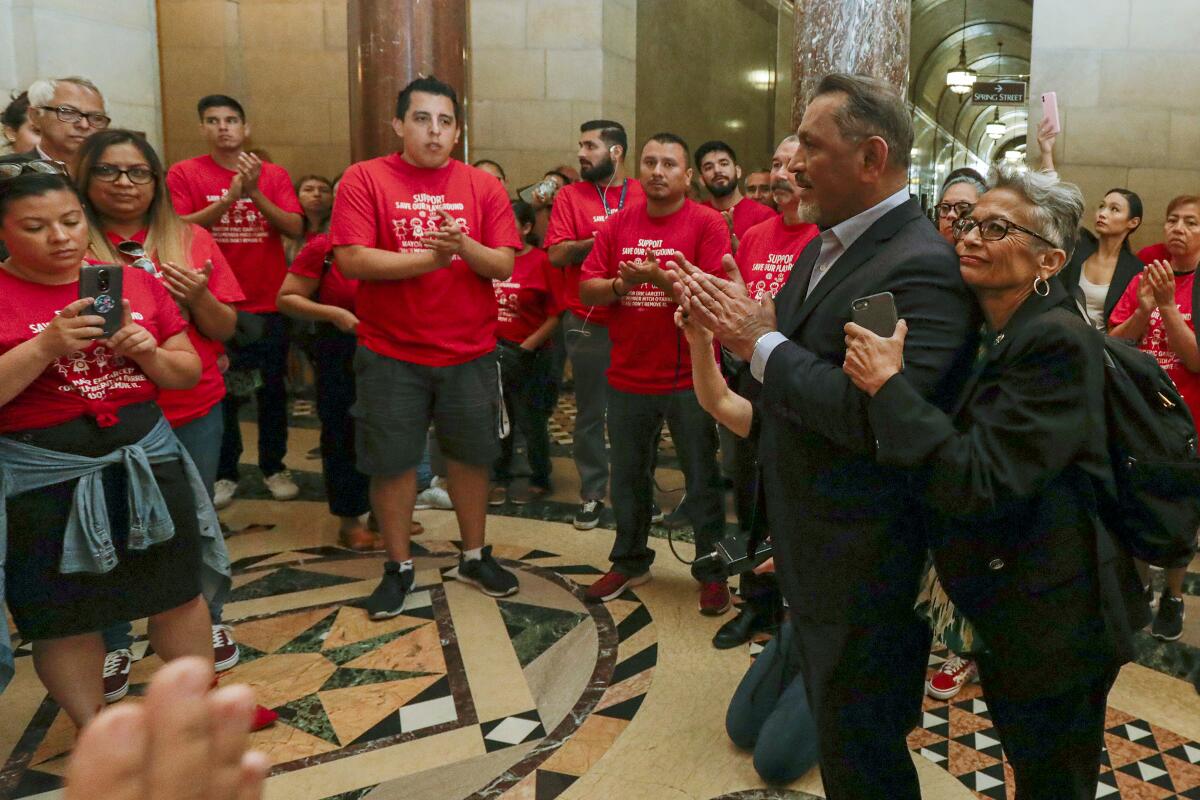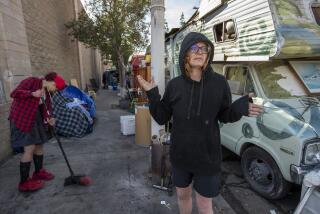An Echo Park lot could become homeless housing after a bitter clash at City Hall

Los Angeles is pressing forward with a bitterly contested plan to put housing for the homeless on an Echo Park lot, defying the objections of a local nonprofit and a councilman who denounced the move as an attack on the Latino community.
“We’re already being attacked by the Trump administration, and now we’re being attacked by our local City Council member,” El Centro del Pueblo program director Fernando Chacon told reporters ahead of the Wednesday vote, flanked by politicians and supporters in red T-shirts that declared “Save Our Playground.”
The Echo Park land has been leased by the nonprofit El Centro del Pueblo, which provides youth and family services aimed at preventing gang violence, for recreational space including basketball and handball courts. L.A. officials say the space could accommodate as many as 98 units of housing because it is zoned for taller buildings than other nearby lots.
Councilman Mitch O’Farrell, who represents the area, billed it as a prime opportunity to house vulnerable people and argued that the city could incorporate recreational space into the new project.
“This has never been about homeless individuals, homelessness versus children,” O’Farrell said. “This is a proposal to accommodate both populations and both needs.”
El Centro del Pueblo and its supporters — including former L.A. Councilmen Richard Alatorre and Mike Hernandez — vigorously protested the move. Former county Supervisor Gloria Molina framed the decision about the Echo Park lot as the latest effort to force something onto a disadvantaged community because local leaders assumed residents would not complain.
“I’m asking you to not pit one vulnerable community against another,” Molina urged council members before the vote. “This is the wrong place. It is the wrong choice.”
Council members usually defer to the politician who represents the area — in this case, O’Farrell — when housing or other development projects are planned in their districts. Councilman Gil Cedillo, who says the majority of El Centro del Pueblo clients live in his district, urged the council to break with that practice and send the decision back to his committee for more review.
If Councilman Joe Buscaino tried to tear down the Watts Towers for housing, Cedillo argued, “we know that we would not defer to this unwritten rule.”
The clash had grown louder in recent weeks, with Cedillo labeling the arguments against turning to other Echo Park properties as deceptive and “Trumpian.”
O’Farrell fired back by accusing Cedillo of trying to use a city resource to help a personal friend — the executive director of the nonprofit. Cedillo said Wednesday that this was not a squabble with a colleague but a fight for justice for the Latino community.
Cedillo lamented in a later statement that “only the Latino community is being forced to give up their efforts to provide the best care for their children for misguided attempts to solve the housing crisis.”
“No other community has been offered that patently racist — and absurd — choice,” Cedillo said.
Some residents showed up to support the plan. Echo Park resident Darcy Harris said the proposal could still accommodate outdoor space for El Centro del Pueblo. Elson Trinidad, who lives elsewhere in the council district, lamented that Angelenos are always urging politicians to “do something” about homelessness, but “when the city is doing something, we don’t want it.”
“We can’t afford to say, ‘Not in our backyard’ when we have homelessness in our frontyards,” Trinidad said.
The City Council ultimately voted 10 to 2 to move forward with the plan Wednesday, kicking off a process for developers to turn in proposals for homeless housing on the Glendale Boulevard site. Cedillo and Buscaino opposed the move.
Shortly after the vote, people began yelling “Shame on you!” and “Recall Mitch!” in the council chambers.
“It’s not over!” one woman shouted.
Although the Wednesday vote marks a major step toward developing the Echo Park site, the process isn’t finished: After developers come up with their ideas and turn them in to the city, L.A. is then expected to choose a winner and enter into an agreement with them to remake the site, which would require more votes by council members.
More to Read
Sign up for Essential California
The most important California stories and recommendations in your inbox every morning.
You may occasionally receive promotional content from the Los Angeles Times.











